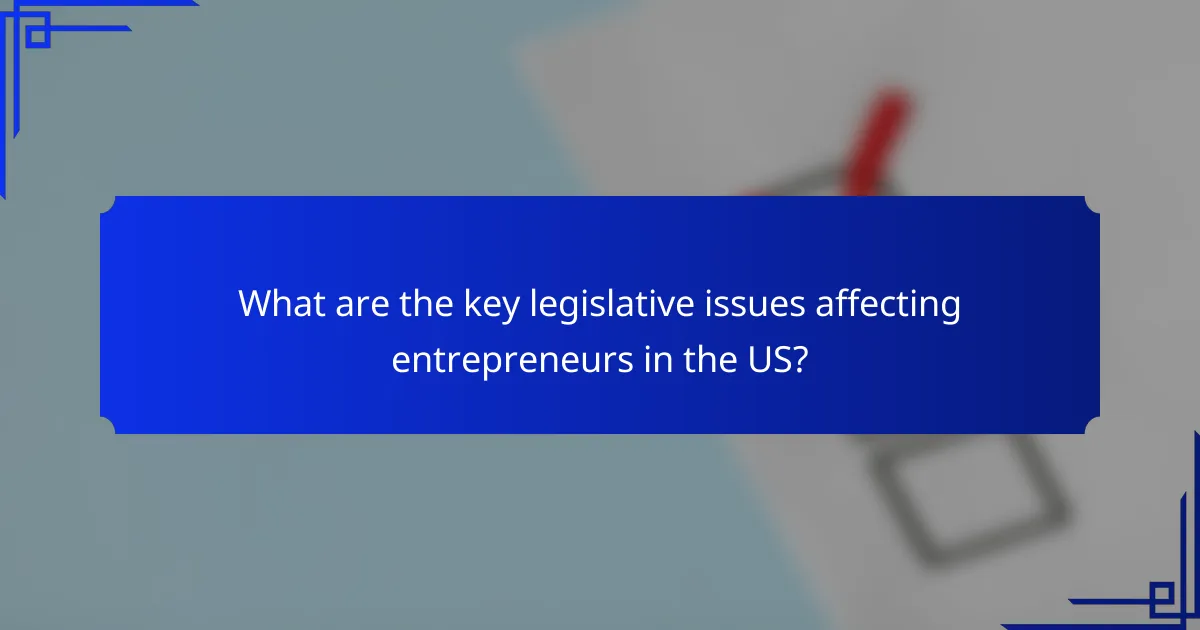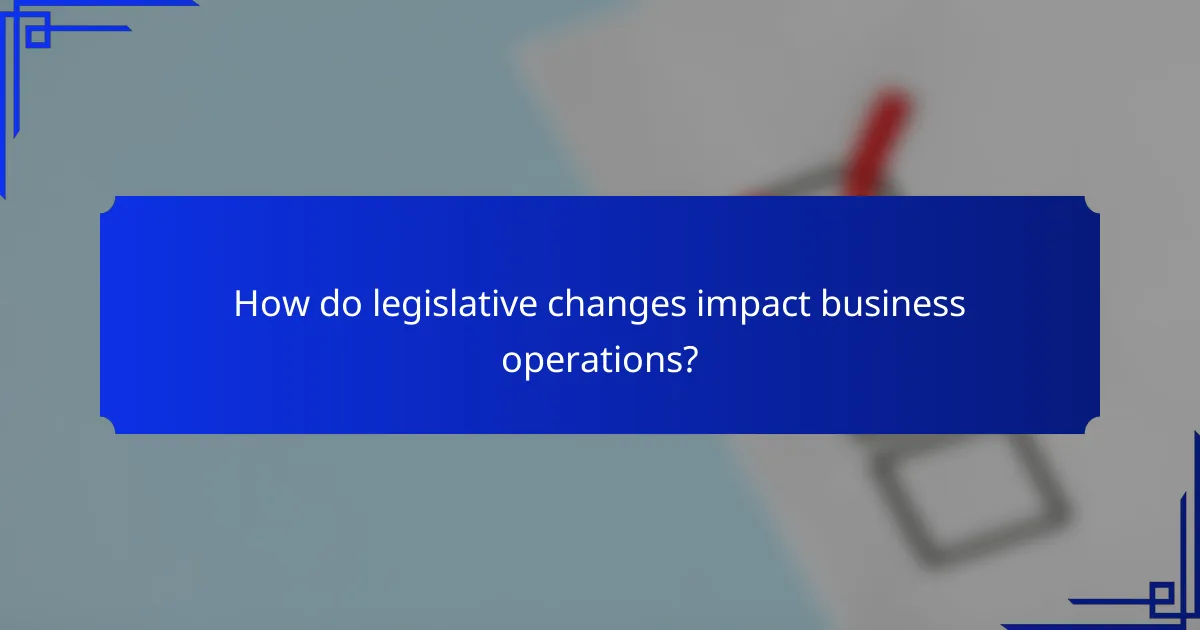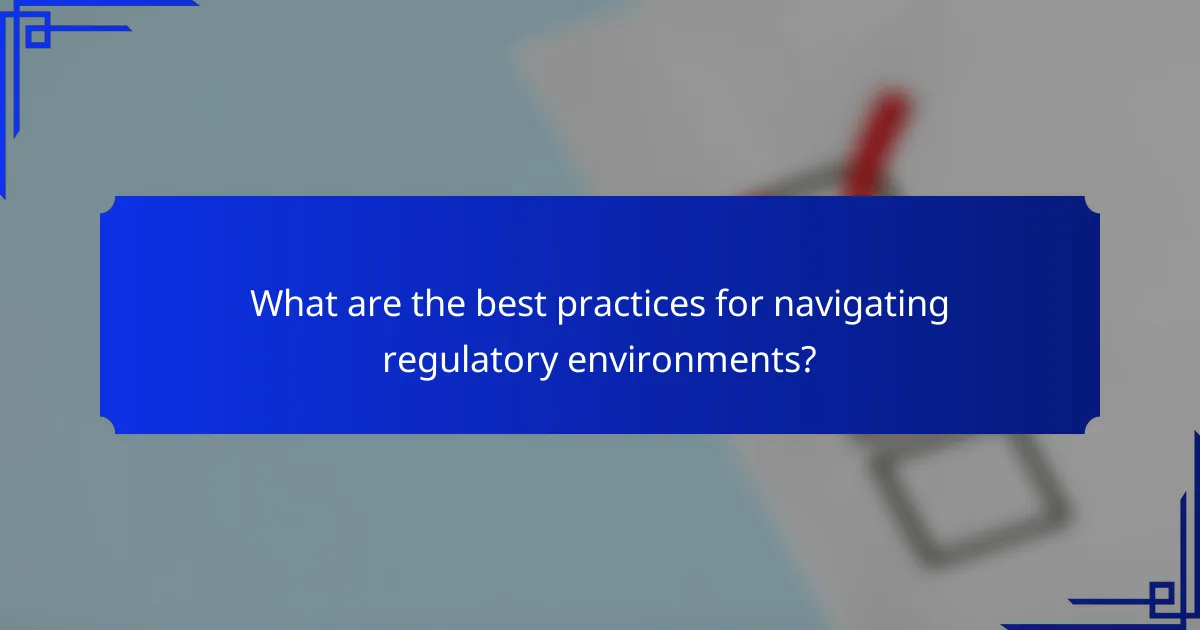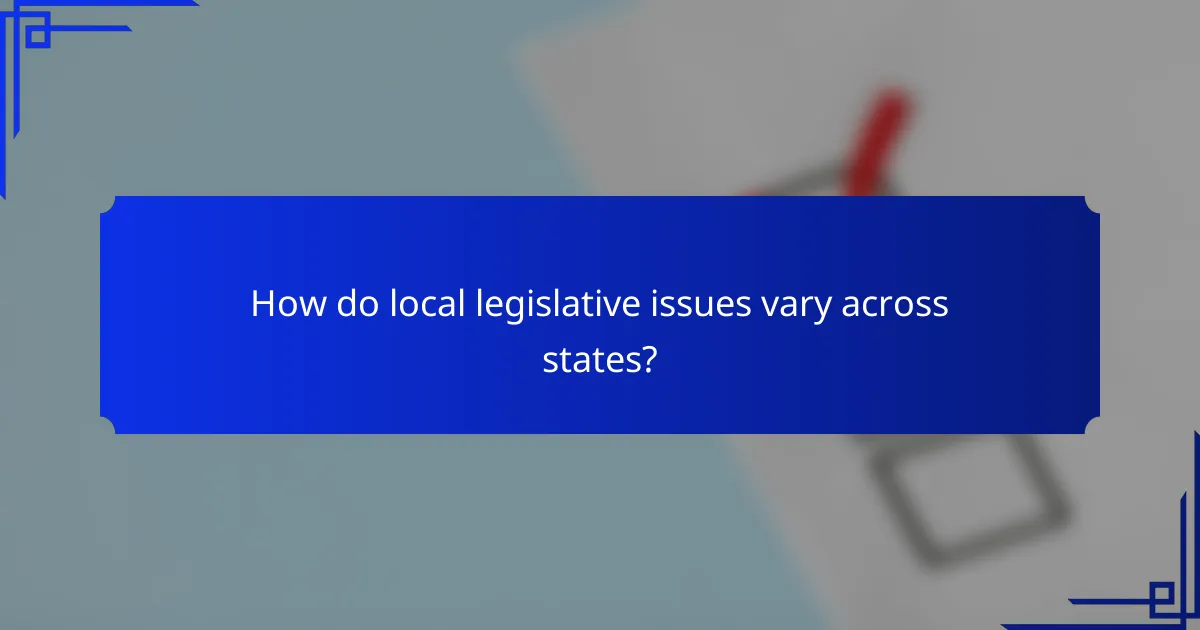Entrepreneurs in the US encounter a range of legislative issues that can profoundly affect their business operations and growth potential. Key topics such as tax reforms, regulatory compliance, and labor law changes present both challenges and opportunities, requiring strategic adaptations to remain competitive in a dynamic market. By proactively addressing these legislative risks and engaging with policymakers, entrepreneurs can better navigate the complexities of the regulatory landscape.

What are the key legislative issues affecting entrepreneurs in the US?
Entrepreneurs in the US face several critical legislative issues that can significantly impact their operations and growth. These include tax reforms, regulatory compliance, intellectual property protection, labor law changes, and environmental regulations, each presenting unique challenges and opportunities.
Tax reform implications
Tax reform can alter the financial landscape for entrepreneurs, affecting everything from income tax rates to deductions and credits. Recent reforms have introduced changes that may benefit small businesses, such as lower corporate tax rates and expanded deductions for certain expenses.
Entrepreneurs should stay informed about potential changes in tax legislation, as these can influence cash flow and investment decisions. Consulting with a tax professional can help navigate these complexities and optimize tax strategies.
Regulatory compliance challenges
Regulatory compliance is a significant concern for entrepreneurs, as failure to adhere to laws can result in penalties or business closure. Regulations can vary widely by industry and location, making it essential for business owners to understand the specific requirements that apply to their operations.
To manage compliance effectively, entrepreneurs should establish a system for monitoring relevant regulations and consider investing in compliance software or consulting services. Regular training for employees on compliance practices can also mitigate risks.
Intellectual property protection
Intellectual property (IP) protection is crucial for entrepreneurs to safeguard their innovations and brand identity. This includes patents, trademarks, and copyrights, which can provide a competitive edge in the marketplace.
Entrepreneurs should consider registering their IP early in the business lifecycle to prevent infringement. Engaging with an IP attorney can help navigate the complexities of protection and enforcement, ensuring that valuable assets are legally secured.
Labor law changes
Labor law changes can significantly affect hiring practices, employee rights, and workplace policies. Recent shifts in legislation may impact minimum wage standards, overtime pay, and employee classification, which can alter operational costs and workforce management strategies.
Entrepreneurs should stay updated on labor laws and consider conducting regular audits of their HR practices. Implementing clear policies and providing employee training can help ensure compliance and foster a positive workplace culture.
Environmental regulations
Environmental regulations are increasingly influencing how businesses operate, particularly in industries with significant ecological impacts. Entrepreneurs must navigate local, state, and federal laws that govern waste management, emissions, and resource use.
To comply with environmental regulations, entrepreneurs should conduct environmental impact assessments and consider sustainable practices that not only meet legal requirements but also appeal to environmentally conscious consumers. Investing in green technologies can also enhance brand reputation and operational efficiency.

How do legislative changes impact business operations?
Legislative changes can significantly influence business operations by altering regulations, compliance requirements, and market conditions. These changes can affect costs, operational processes, and access to markets, necessitating strategic adjustments by businesses to maintain competitiveness.
Cost implications
Changes in legislation often lead to direct cost implications for businesses. For instance, new taxes or compliance fees can increase operational expenses, while labor laws may necessitate higher wages or benefits. Companies should assess potential cost increases and budget accordingly to avoid financial strain.
Additionally, businesses might face costs related to adapting their operations to meet new regulatory standards. This could include investing in new technology or training employees, which can be substantial depending on the scale of the changes.
Operational adjustments
Legislative changes may require businesses to make significant operational adjustments. This could involve revising internal policies, updating procedures, or even restructuring teams to ensure compliance with new laws. Companies should conduct thorough reviews of their operations to identify necessary changes.
For example, if a new environmental regulation is introduced, a manufacturing firm might need to alter its production processes to reduce emissions. Proactive adjustments can help mitigate disruptions and maintain efficiency.
Market access changes
Legislative changes can also affect market access, either by opening new opportunities or imposing restrictions. For instance, trade agreements or tariffs can alter the landscape for businesses looking to expand internationally. Understanding these changes is crucial for strategic planning.
Companies should monitor legislative developments that impact their target markets. Engaging with local industry groups or legal advisors can provide insights into how new laws may affect market entry or competition, allowing businesses to adapt their strategies effectively.

What entrepreneurial strategies can mitigate legislative risks?
Entrepreneurs can mitigate legislative risks through proactive compliance planning, engaging with policymakers, and forming legal advisory partnerships. These strategies help businesses navigate complex regulations and adapt to changes in the legislative landscape.
Proactive compliance planning
Proactive compliance planning involves anticipating potential regulatory changes and preparing accordingly. Businesses should regularly review relevant laws and regulations to ensure they remain compliant and avoid penalties. This can include developing internal policies that align with current legislation.
For example, a company in the food industry might implement strict quality control measures to comply with health regulations. Regular audits and training sessions can help maintain compliance and reduce the risk of violations.
Engagement with policymakers
Engaging with policymakers allows entrepreneurs to influence legislative processes and advocate for favorable regulations. This can involve participating in public consultations, joining industry associations, or directly contacting elected officials to express concerns or suggestions.
Building relationships with policymakers can lead to better understanding and collaboration, which may result in more favorable outcomes for businesses. Entrepreneurs should stay informed about legislative developments and be prepared to voice their perspectives effectively.
Legal advisory partnerships
Forming partnerships with legal advisors can provide entrepreneurs with the expertise needed to navigate complex regulations. Legal advisors can help identify potential risks and recommend strategies to mitigate them. This partnership is especially valuable in industries with rapidly changing laws.
For instance, a startup in the technology sector may benefit from legal counsel specializing in data privacy laws to ensure compliance with regulations like GDPR. Regular consultations can help businesses stay ahead of legal challenges and avoid costly mistakes.

What are the best practices for navigating regulatory environments?
To effectively navigate regulatory environments, businesses should stay informed about current laws and adopt proactive strategies. This involves regular monitoring of policy changes and implementing frameworks that assess risks associated with compliance.
Regular policy updates
Staying updated on regulatory changes is crucial for businesses to remain compliant and avoid penalties. Companies should designate a team or individual responsible for monitoring relevant legislation and industry standards, ensuring they are aware of any updates that may impact operations.
Utilizing technology, such as compliance management software, can streamline the process of tracking policy changes. Regular training sessions for employees on new regulations can also enhance compliance and reduce risks.
Risk assessment frameworks
Implementing a risk assessment framework helps businesses identify potential compliance risks and develop strategies to mitigate them. This involves evaluating the likelihood and impact of various regulatory risks and prioritizing them based on their significance to the organization.
Common frameworks include the COSO ERM and ISO 31000, which provide structured approaches to risk management. Regularly reviewing and updating these assessments ensures that the business adapts to evolving regulatory landscapes and maintains compliance effectively.

How do local legislative issues vary across states?
Local legislative issues differ significantly across states due to varying laws, regulations, and political climates. These differences can impact businesses, entrepreneurs, and residents, shaping everything from tax structures to labor laws.
State-specific tax incentives
State-specific tax incentives are financial benefits offered by individual states to attract businesses and stimulate economic growth. These incentives can include tax credits, deductions, and exemptions that vary widely from one state to another.
For example, some states may offer substantial tax credits for renewable energy projects, while others may provide incentives for technology startups. Entrepreneurs should research their state’s offerings, as these incentives can significantly reduce operational costs and improve profitability.
When considering state-specific tax incentives, it’s crucial to evaluate the eligibility criteria and compliance requirements. Entrepreneurs should avoid common pitfalls, such as overlooking application deadlines or failing to meet specific conditions, which can result in lost opportunities. A checklist of required documentation can help ensure a smooth application process.
